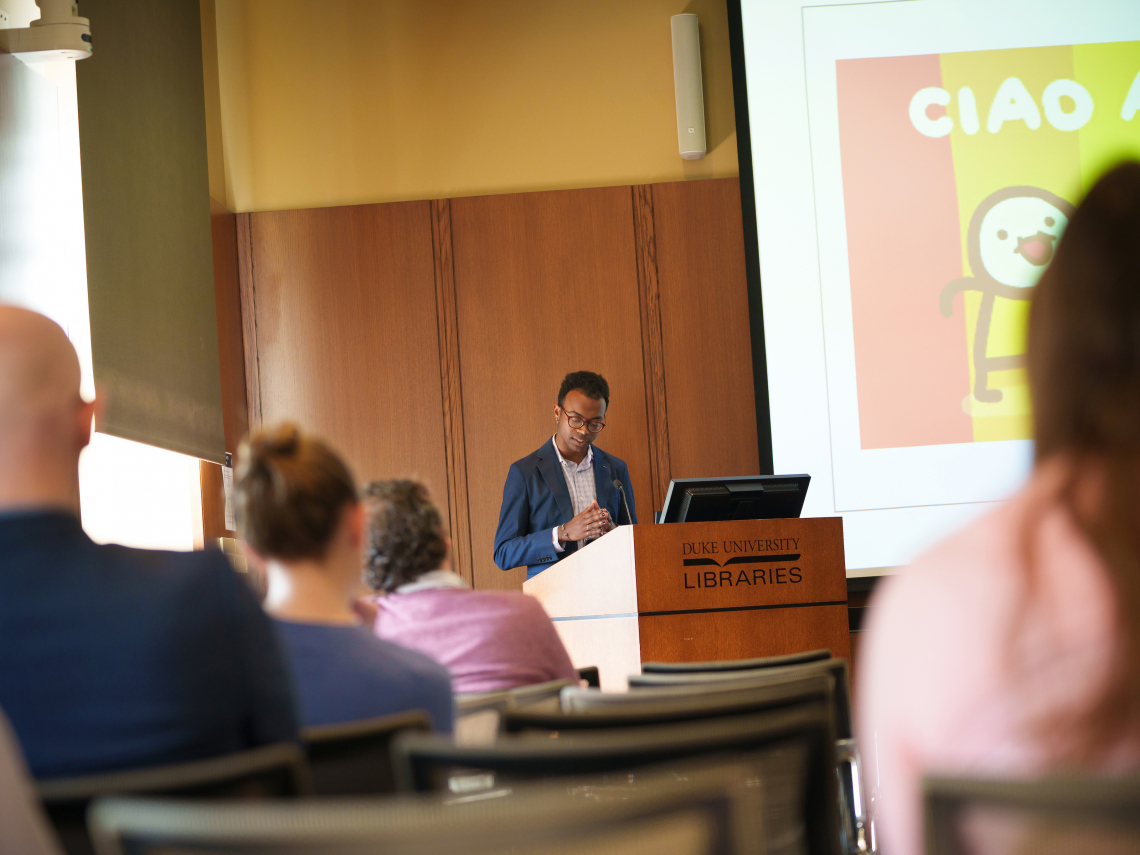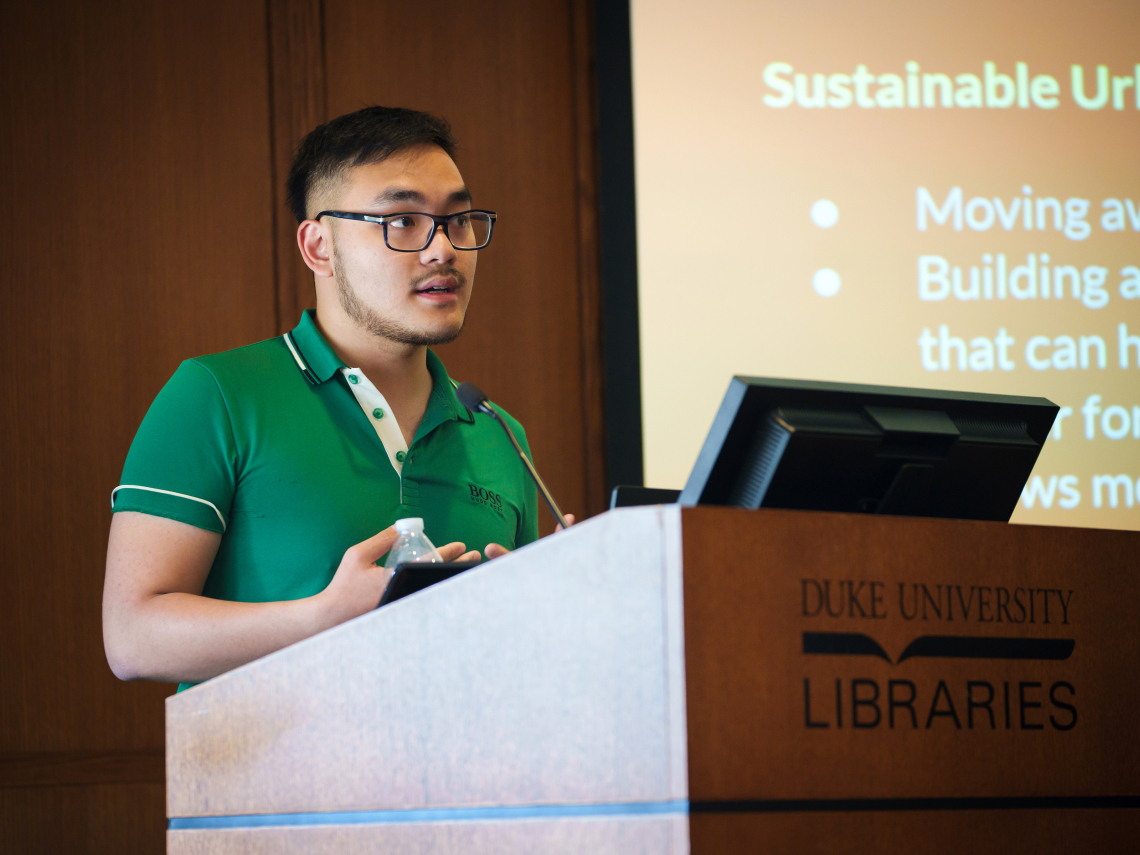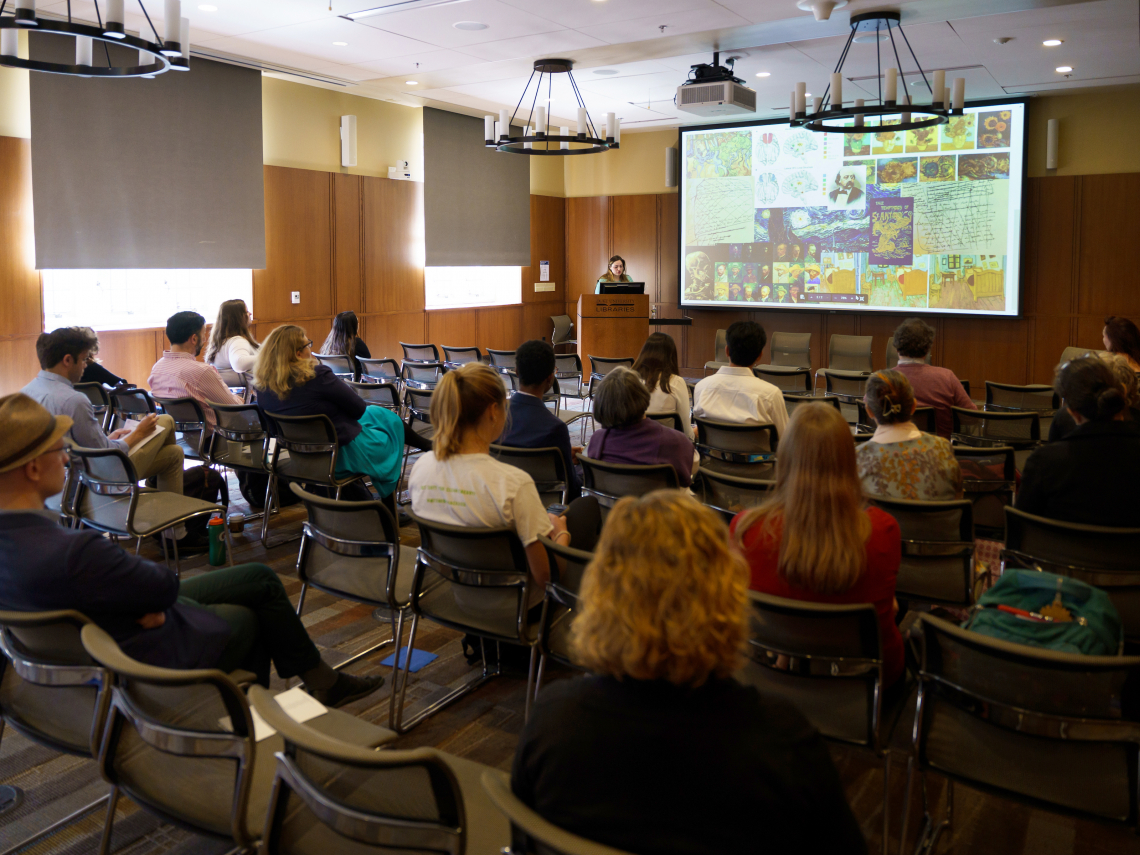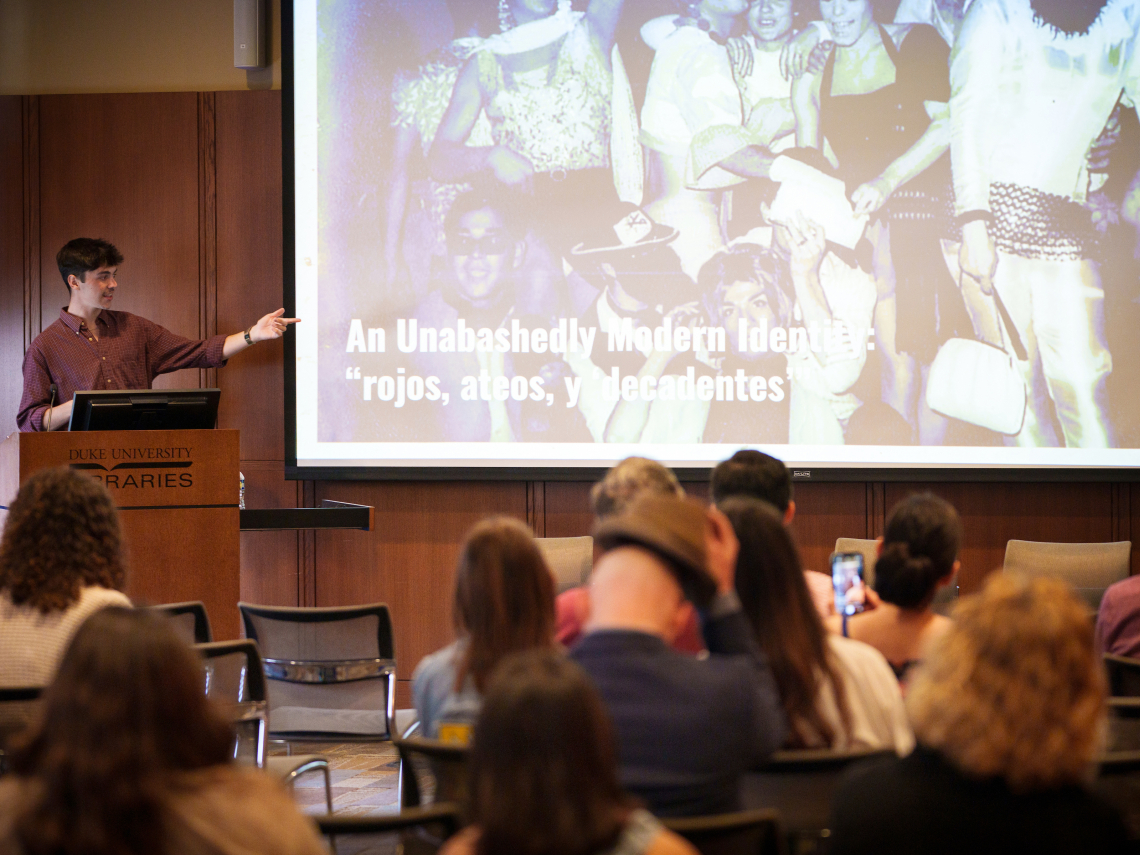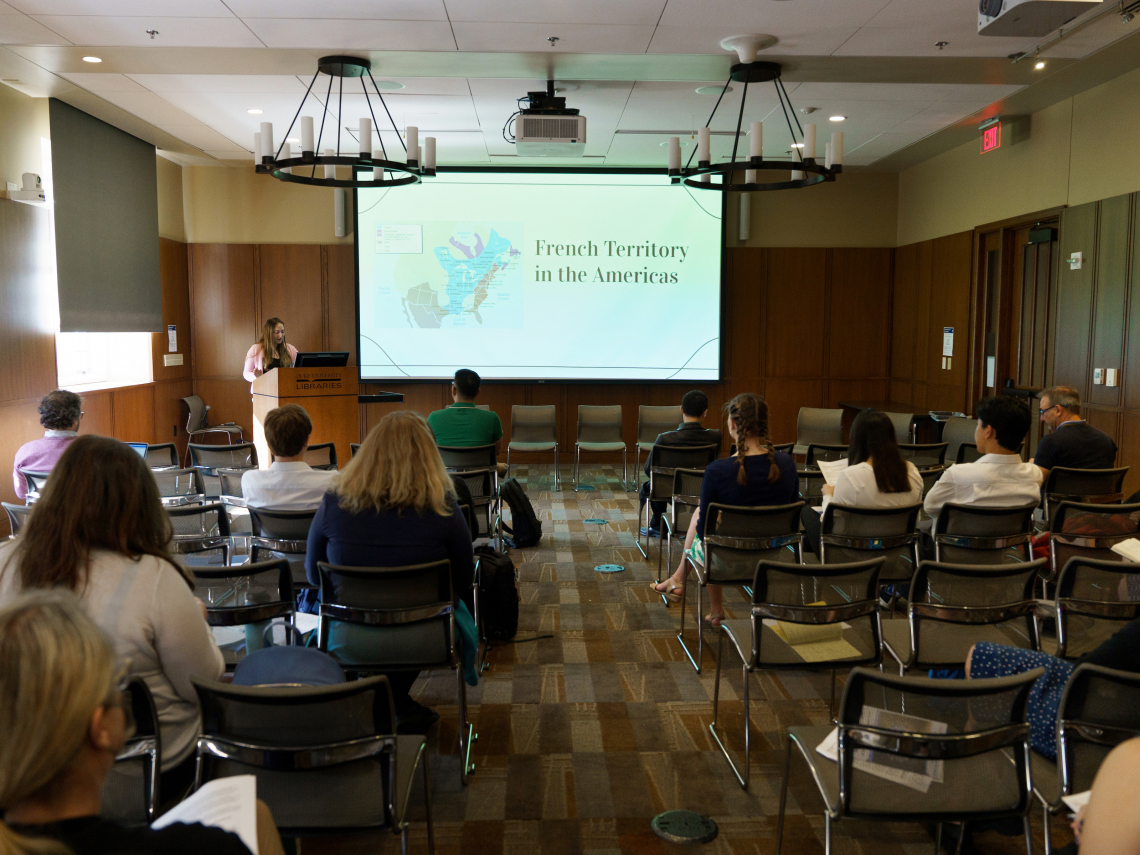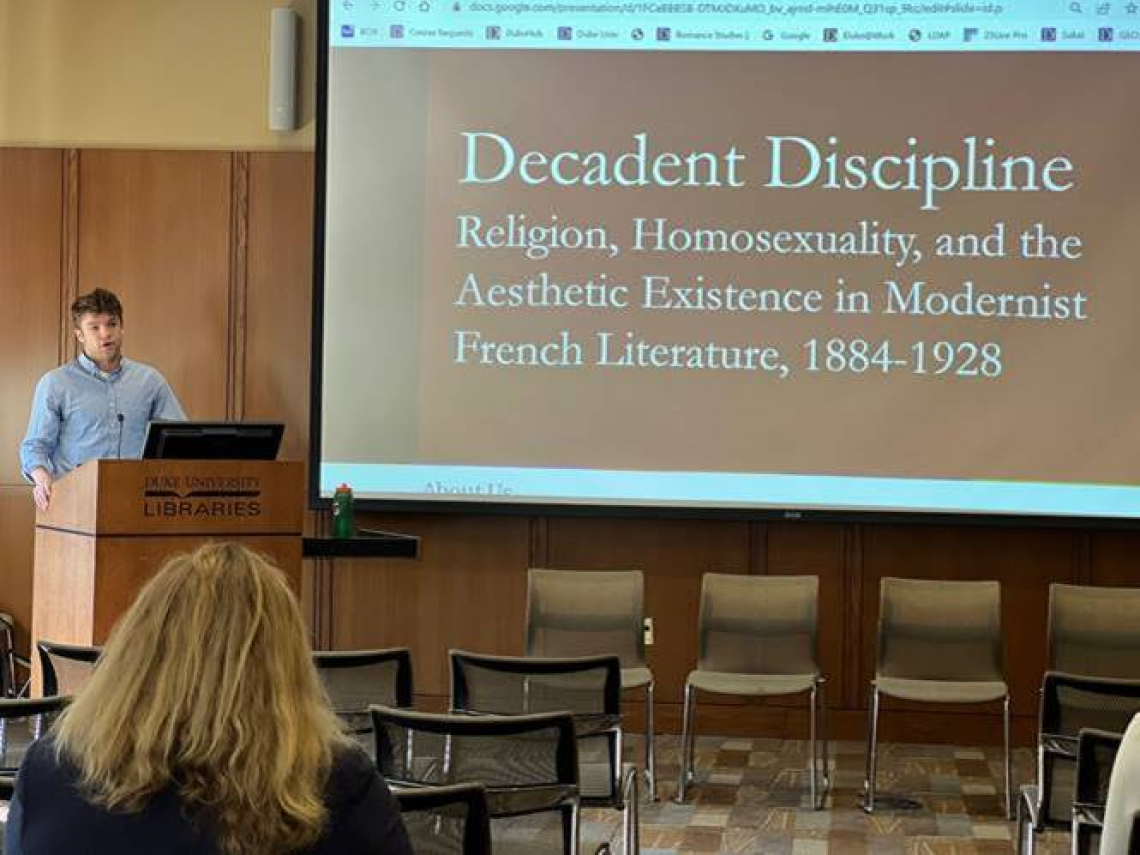Six Graduating Seniors Reflect on their Experience as Undergraduate Researchers
On March 24, the Department of Romance Studies hosted its 13th Annual Undergraduate Research Symposium.
The event celebrates original research from undergraduate students, completed as part of Romance Studies coursework.
Six graduating seniors, each nominated by department faculty to present at the symposium, reflect on the research process and the experience of presenting to an audience of faculty and peers during their final term as Duke undergraduate students.
Daniel Sutton, a senior Graduating with Distinction, majoring in Linguistics and Italian Studies with a minor in Sexuality Studies, is a member of Duke’s Hoof ‘n’ Horn and Something Borrowed Something Blue, as well as a Duke Presidential Ambassador. Sutton spent his junior year studying in Italy where he furthered his language education and developed a deeper understanding of Italian sociolinguistics. Sutton has a passion for language learning and hopes to continue language anthropology research after graduation.
“Linguistics is a field that often goes underappreciated and ignored, but language is the foundation of culture and society. Without it, there is so much we would not be able to do. For me, presenting at the research symposium was another opportunity to communicate this importance of language and of the diffusion of linguistic thought. With growing instances of exclusion and hate, linguistic change is the necessary next step for change. If we change the way we talk, we change the way we think.”
Language and the Gendered Self: Addressing Grammatical Gender in the Italian Language — Increased language and gender research have broadened and extended conversations about gender identities and pronouns. As these conversations make their way into more academic circles it is becoming increasingly important for educators of Romance languages to take into account the ways that their current instructional resources and practices represent gender and reinforce social gender binaries. The Italian language makes this pursuit towards a more inclusive language difficult grammatically, structurally, and due to resistance from the L1 speakers themselves. This thesis is a response to such resistance because the dynamic nature of language means that it must be readily applicable to the culture in which it is used. Language education is the first step in addressing these linguistic issues. Sutton's research is an examination of works in these fields to discover the best methods for creating a gender inclusive pedagogy in Italian classrooms in the United States. It takes into account the role of linguistic ideologies and brings together research of gender-just and critical race pedagogies to create a new pedagogical method that fosters more welcoming second language learning environments.
Thuan Tran, a senior majoring in Political Science, plans on working in the international development space after graduation. Tran’s academic interests include the study of inequality and policy directives that break down socioeconomic barriers around the globe — specifically in Southeast Asia, where he is from originally. Outside of academics, Tran enjoys watching and playing tennis, singing a cappella as a member of the Duke University Chorale and watching television.
“Having the opportunity to present on urban mobility in Latin America was really meaningful for me. I have been interested in looking at cities mobility for a long time, so being able to do that research on Latin America and present it in the Research Symposium was really great. I was honored to present with my fellow panelists because our presentations all tackled topics that require institutional changes and to discuss that with them was helpful for me. Overall, I am grateful for the opportunity to do this research and present in front of my peers and professors in the department.”
The Present and Future of Urban Design Policies in Latin America — As population grows rapidly and the world moves to utilize resources in more sustainable ways, mobility and smart urban design become central to how society is organized. Tran's presentation looked at urban design policies in multiple Latin American states and discussed the future of this vitally important topic in urbanizing Latin American cities. It also dissected the importance of smart urban design in building communities and erasing socioeconomic inequities.
Gwyneth Bernier is a senior Graduating with Distinction, completing a major in International Comparative Studies and a minor in French. Bernier’s research focus is in law, human rights and forced migration in the francophone regions of Africa.
“I’ve presented at the Romance Languages Symposium three years in a row now, and I’ve always loved how the event brings together the Romance languages at Duke as a cohesive research community. It’s always so exciting to gain exposure to the fascinating research others are doing on campus and put my work in conversation with theirs. This year, engaging with my peers and professors about my work offered me an incredible amount of insight into ways to deepen my thesis as I approach my defense in April. I especially appreciate that the symposium is more of a thematically organized conversation from which everyone has worked together to form these bridges of understanding than a series of unrelated presentations.”
Des Péchés de Flaubert aux Tournesols de Van Gogh: les Caractéristiques d'une Obsession Partagée Chez Deux Titans Artistiques (From Flaubert's Sins to Van Gogh's Sunflowers: The Hallmarks of a Shared Obsession in Two Artistic Titans) — Despite using different mediums, the respective works of 19th century French writer Gustave Flaubert and 19th century French-Dutch painter Vincent Van Gogh had much in common. Both visionaries suffered from frontal lobe epilepsy and tonic-clonic seizures and hallucinations, which resulted in many shared obsessive tendencies in their work and a focus on existentialism. This chapter of Bernier's larger thesis, « L’œuvre de ma vie »: Une exploration neuro-génétique de La Tentation de Saint Antoine, which explores the neurological implications of the evolution Flaubert's greatest work, La Tentation de Saint Antoine, specifically analyzes why the surreal images that emerged from Flaubert's pen bear a striking resemblance to those that emerged from Van Gogh's paintbrush. It analyzes major recurring themes — such as death — in the work of both creatives and hypothesizes that these men might have felt the need to obsessively redo their work because of a shared obsessive goal to refine their artistic styles
Steven Powell is a senior majoring in Public Policy and International Comparative Studies focused on Latin America with a minor in Spanish. After graduation, Powell plans to spend time working abroad in Latin America and eventually attend law school, focusing on international law. He is especially passionate about research and service work focused on equity and justice for vulnerable populations.
“Researching and writing for this project was a challenging and rewarding process that put my interdisciplinary education to use. I was able to make connections about what I had learned in my class Capitalism and the Modern City with previous Gender, Sexuality and Feminist Studies classes I had taken. I learned about my class, the Spanish language, the world, and about myself and my own identity.”
La Amenaza del Homosexual: the Creation, Oppression, and Proliferation of the Homosexual Under the Franco Regime in Spain — Under the rule of Francisco Franco, the figure of the homosexual in Spain was created as a legal identity and punished in new manners. Investigating why the Franco regime gave special attention towards the definition, persecution, and punishment of homosexuals reveals the fears underpinning the regressive regime about the country’s transition to modernity. Prior to Franco, there were no laws in Spain that criminalized being homosexual. Pulling from a Foucauldian analysis, Spanish anti-sodomy laws transitioned from criminalizing acts to criminalizing personhood. This new legally punishable category helped develop the modern recognizable character of the homosexual. The methods of punishment were simultaneously changing alongside the shifts of legal status which highlight fears of homosexuality’s virality and association with leftist politics. Punishments started as fines and incarceration but escalated to labor camps and forced institutionalization under Franco’s thumb. Rather than eradicating homosexuality in Spain, the increasingly punitive laws resulted in the creation of a politically active community of people who now united under the new identity of homosexual.
Audrey Costley, a senior from Chapel Hill Graduating with Distinction, is completing a double major in Public Policy and French with a minor in Linguistics. Costley loves learning about language and culture and has grown personally and academically through the experience of studying in Paris and in Aix-en Provence through Duke’s Global Education Office. When on campus, Costley is involved in a Bass Connections team researching multilingualism, music and the brain. In her free time, she likes spending time outdoors and backpacking and camping with friends.
“Presenting at the Romance Studies undergraduate research symposium was a great experience to share my interests and research with faculty and students in the department. I really enjoyed hearing from fellow students, discussing the culmination of their undergraduate studies, and learning about their interests across different languages and topics.”
Linguistic Policy and Planning in Francophone Louisiana: An analysis of the state and outlook of French in Louisiana — Many are aware that Louisiana was once part of the French Empire in the Americas, but how can we see this francophone heritage today? Beyond the facade of the Mardi Gras festivals and the French Quarter in New Orleans, to what extent does the state actually reflect a francophone history in the present day? This presentation is a part of Costley’s senior honors thesis' research. It explores the impact of linguistic policy and planning on the use of Louisiana French and Creole historically. Particularly, how implicit and explicit policies repressed the French language in the past. It also analyzes present day movements and systems to revitalize and promote the French Language in Louisiana. Beginning in the 1960s, there was a shift in the public consciousness towards a greater value of minority languages and cultural groups, leading to policy to protect against language loss. How effective have these policies been and what is the future outlook on francophone Louisiana?
Stephen Atkinson is a senior Graduating with Distinction majoring in French and History. His academic interests include 19th century French and English literature, continental philosophy and the history of religion and sexuality. Outside of classroom, Atkinson is the booking manager at Duke Coffeehouse, a student-run music venue hosting local and international artists.
“'Decadence' has been of an interest (or fixation) of mine since I first read Picture of Dorian Gray in high school; it re-surfaced my sophomore year in a Classical Studies course on Nero, then my junior year in French classes on post-modernity and the history of dance. So, it feels like a fitting cap on my college experience to have presented this project in my final term at Duke. Going forward, amid a historical moment marked by deepening socio-political divisions and an ambient mood of existential doom, searching for styles of existence that negotiate or transcend dominant power structures and epistemologies seems, to me, a necessary line of thinking to continue.”
Decadent Discipline in Early 20th Century French Literature — Atkinson's project surveys the afterlives of Decadence from the fin de siècle to early 20th century French literature. In this presentation, he explained the seemingly paradoxical concept of decadent discipline, analyzing the ways in which a subject position associated with decadence intersects with self-discipline in works of fiction both vindicating and critiquing decadence. The literature under consideration ranges from the Decadent movement itself, such as J.K. Huysmans’ A rebours (1884) and Jean Lorrain’s Monsieur de Phocas (1901), to André Gide’s L’Immoraliste (1902), Marcel Proust’s Sodome et Gomorrhe (1921) and Jean Cocteau’s Le Livre Blanc (1930). Nietzsche’s understanding of decadence, at the intersection of aesthetic, medical, and moral discourses, guided the analysis alongside Foucault’s concepts of aesthetic existence and the care of the self.

